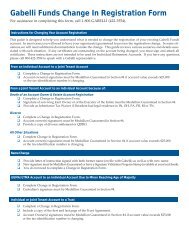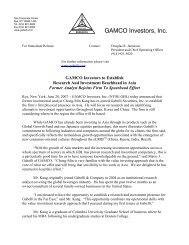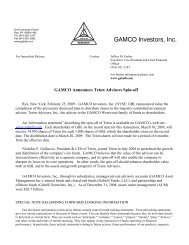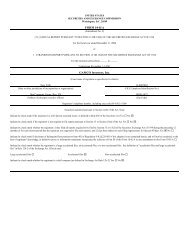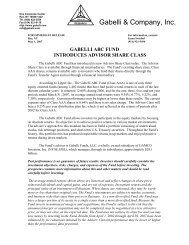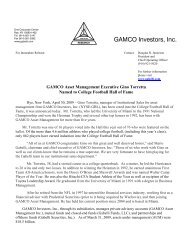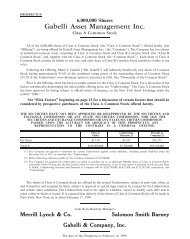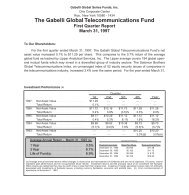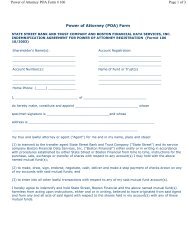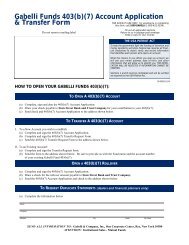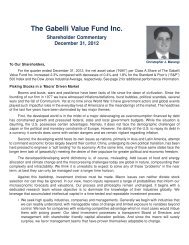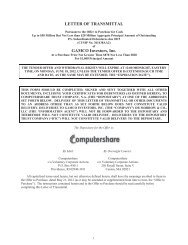Statement of Additional Info - Gabelli
Statement of Additional Info - Gabelli
Statement of Additional Info - Gabelli
You also want an ePaper? Increase the reach of your titles
YUMPU automatically turns print PDFs into web optimized ePapers that Google loves.
Institutional investors depend on an efficient institutional market in which the unregistered security can be readily resold<br />
or on an issuer's ability to honor a demand for repayment. As a result, the fact that there are contractual or legal<br />
restrictions on resale to the general public or to certain institutions may not be indicative <strong>of</strong> the liquidity <strong>of</strong> such<br />
investments.<br />
Each Fund may invest up to 10% (except for the SmallCap Equity Fund, Mighty Mites Fund, and Income Fund which<br />
may invest up to 15%) <strong>of</strong> its net assets in illiquid securities, including certain restricted securities issued under Section<br />
4(2) <strong>of</strong> the Securities Act. Section 4(2) instruments are restricted in the sense that they can only be resold through the<br />
issuing dealer and only to institutional investors; they cannot be resold to the general public without registration.<br />
Restricted securities issued under Section 4(2) <strong>of</strong> the Securities Act will generally be treated as illiquid and subject to<br />
each Fund's investment restriction on illiquid securities unless such securities are eligible for resale under Rule 144A and<br />
are deemed to be liquid in accordance with the procedures described below.<br />
Rule 144A under the Securities Act allows a broader institutional trading market for securities otherwise subject to<br />
restriction on resale to the general public. Rule 144A establishes a "safe harbor" from the registration requirements <strong>of</strong> the<br />
Securities Act applicable to resales <strong>of</strong> certain securities to qualified institutional buyers. It is the intent <strong>of</strong> the Funds to<br />
invest, pursuant to procedures established by the Board and subject to applicable investment restrictions, in securities<br />
eligible for resale under Rule 144A which are determined to be liquid based upon the trading markets for the securities.<br />
The Adviser will monitor the liquidity <strong>of</strong> restricted securities eligible for resale under Rule 144A in a Fund's portfolio<br />
under the supervision <strong>of</strong> the Trustees. In reaching liquidity decisions, the Adviser will consider, inter alia, the following<br />
factors: (1) the frequency <strong>of</strong> trades and quotes for the security over the course <strong>of</strong> six months or as determined in the<br />
discretion <strong>of</strong> the Adviser; (2) the number <strong>of</strong> dealers wishing to purchase or sell the security and the number <strong>of</strong> other<br />
potential purchasers over the course <strong>of</strong> six months or as determined in the discretion <strong>of</strong> the Adviser; (3) dealer<br />
undertakings to make a market in the security; (4) the nature <strong>of</strong> the security and the nature <strong>of</strong> how the marketplace trades<br />
(e.g., the time needed to dispose <strong>of</strong> the security, the method <strong>of</strong> soliciting <strong>of</strong>fers, and the mechanics <strong>of</strong> the transfer); and<br />
(5) other factors, if any, which the Adviser deems relevant. The Adviser will also monitor the purchase <strong>of</strong> Rule 144A<br />
securities which are considered to be illiquid to assure that the total <strong>of</strong> all such Rule 144A securities held by a Fund does<br />
not exceed 10% <strong>of</strong> the Fund’s average daily net assets (except for the Mighty Mites Fund, SmallCap Equity Fund, and<br />
Income Fund, which may invest up to 15%).<br />
Other Investment Considerations. Investment decisions for each Fund are made independently from those <strong>of</strong> other<br />
investment advisory accounts that may be advised by the Adviser or the Sub-Adviser. However, if such other investment<br />
advisory accounts are prepared to invest in, or desire to dispose <strong>of</strong>, securities <strong>of</strong> the type in which a Fund invests at the<br />
same time as the Fund, available investments or opportunities for sales will be allocated equitably to each <strong>of</strong> them. In<br />
some cases, this procedure may adversely affect the size <strong>of</strong> the position obtained for or disposed <strong>of</strong> by a Fund or the price<br />
paid or received by the Fund.<br />
Risks Associated With Recent Economic Events<br />
The U.S. credit markets have been experiencing extreme volatility and disruption for more than five years. Instability in<br />
the credit markets has made it more difficult for a number <strong>of</strong> issuers <strong>of</strong> debt securities to obtain financing or refinancing<br />
for their investment or lending activities or operations. In particular, because <strong>of</strong> volatile conditions in the credit markets,<br />
issuers <strong>of</strong> debt securities may be subject to increased cost for debt, tightening underwriting standards and reduced<br />
liquidity for loans they make, securities they purchase and securities they issue. These developments may increase the<br />
volatility <strong>of</strong> the value <strong>of</strong> securities owned by a Fund. These developments may also make it more difficult for a Fund to<br />
accurately value its securities or to sell its securities on a timely basis. These developments may also adversely affect the<br />
broader economy, which in turn may adversely affect the ability <strong>of</strong> issuers <strong>of</strong> securities owned by a Fund to make<br />
payments <strong>of</strong> principal and interest when due, lead to lower credit ratings <strong>of</strong> issuers and increased defaults by issuers. Such<br />
developments could, in turn, reduce the value <strong>of</strong> securities owned by a Fund and adversely affect the net asset value<br />
(“NAV”) <strong>of</strong> its shares.<br />
The Dodd-Frank Wall Street Reform and Consumer Protection Act (the "Dodd-Frank Act") significantly revises and<br />
expands the rulemaking, supervisory and enforcement authority <strong>of</strong> federal bank, securities and commodities regulators. It<br />
is unclear how these regulators will exercise these revised and expanded powers and whether they will undertake<br />
rulemaking, supervisory or enforcement actions that would adversely affect a Fund or investments made by a Fund.<br />
Possible regulatory actions taken under these revised and expanded powers may include actions related to financial<br />
consumer protection, proprietary trading and derivatives. There is a risk that new and additional government regulation<br />
19




